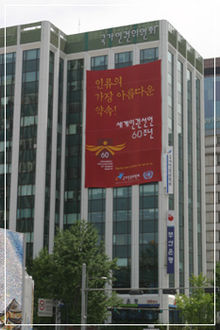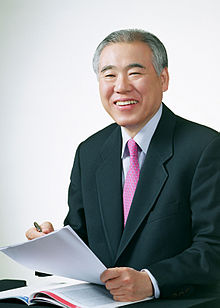- National Human Rights Commission of Korea
-
The National Human Rights Commission of the Republic of Korea (NHRCK) was established on November 25, 2001 under the National Human Rights Commission Act. Fulfilling an election pledge of then-President and 2000 Nobel Peace Prize Laureate Kim Dae-Jung, the Commission was launched as an independent governmental body. It does not belong to any of the legislative, judiciary, and executive branches of the Korean government. And it functions in accordance with the Principles relating to the status and functioning of national human rights institutions for protection and promotion of human rights (Paris Principles) adopted by the UN General Assembly in 1993.
The NHRCK has been a full member of the Asia Pacific Forum of National Human Rights Institutions (APF) and the International Coordinating Committee of National Institutions for the Promotion and Protection of Human Rights (ICC) since 2002. It was accredited in 2004 with an “A status” in the ICC. It served as chair of the APF in 2004 and 2007 and as vice-chair in 2005 and 2008. It also served as a member of the ICC Sub-Committee on Accreditation (2007~09). It hosted the 7th International Conference of National Human Rights Institutions (ICNI) in Seoul in September 2004.
Contents
Vision and Mission
The NHRCK’s vision is to create a society where dignity and human rights of all persons, including foreigners living in the Republic of Korea, are fully respected and realized. To this end, the NHRCK is committed to the full implementation of all human rights set forth in the Constitution as well as international human rights standards at the domestic level in accordance with the Paris Principles.
Mandate and Functions
The NHRCK follows the comprehensive mandate outlined in the NHRCK Act. In order to promote and protect human rights, the Commission performs the following functions:
- Developing human rights policies through conducting human rights research and issuing policy recommendations
- Analyzing laws, policies and practices from a human rights perspective
- Investigating discrimination and human rights violation cases and providing access to remedies* Domestic cooperation with relevant government ministries and agencies, NGOs, and other stakeholders
- Promoting human rights education and raising public awareness of human rights
- Promoting and monitoring national implementation of international human rights treaties
- Cooperating with government agencies, civil society organizations, UN human rights bodies and national human rights institutions(APF, ICC)
- Other matters deemed necessary to protect and promote human rights
Goal and Priorities 2010
The goal for 2010 is to enhance organizational effectiveness and independence by advancing domestic human rights standards and mechanisms in the following six priority areas:
- Rights of persons with disabilities including mental disability
- Migrants and their family members in a multicultural context
- Socially and economically vulnerable groups, in particular, children and the elderly
- Protection of basic political rights
- Human rights protection in the information society such as right to privacy and public access
- Policy development and advocacy on North Korean human rights
Main Achievements
Since its foundation in 2001, the NHRCK has contributed to the improvement of human rights situation in Korean society. Below are, among many others, several significant achievements.
- Handled over 105,000 cases through its counseling service (as of December 2010)
- Over 51,000 complaints filed and investigated (78% human rights violation cases, 18% discrimination cases, and 4% others, as of December 2010)
- Prepared the development and recommendation of the National Human Rights Action Plan (NAP) in January 2006, which was enacted by the government in May 2007 and is currently in implementation
- Advocated for the enactment of the Anti-Discrimination Act against Persons with Disabilities, which was enacted in April 2007 and became effective in April 2008
- Developed human rights educational curriculum and materials (films, animations, posters, etc.)
- Initiated and coordinated the networking among universities for human rights education and research
- Raised awareness about social discriminations based on age, marital status, and gender identity etc.
- Proposed and advocated for improvement of living conditions and practices in detention centers, correctional facilities and military facilities.
Human Rights Films
Since 2002, the NHRCK has produced seven films on human rights issues, including discrimination against migrant workers, prejudice against minorities, in order to develop a human rights culture in Korean society. The films have been distributed to various educational institutions from elementary schools to universities and public libraries around the country.
Detailed information on films can be found at http://culture.humanrights.go.kr
Omnibus Films
- If You Were Me (2002)
- If You Were Me 2 (2004)
- If You Were Me 3 (2006)
- If You Were Me 4 (2007)
- Fly Penguin (2009)
- If You Were Me 5 (2010)
Animated Films
- If You Were Me: Anima Vision (2005)
- If You Were Me: Anima Vision 2 (2007)
Commissioners and Secretariat
The NHRCK consists of eleven commissioners: Chairperson, three standing commissioners, and seven non-standing commissioners. All commissioners are appointed based on their personal capacity for a term of three years and can be reappointed for another term of three years. Minimum number of four commissioners shall be women.
The Plenary Committee, the highest decision-making body, meets twice a month while Standing commissioners Committee meets once a week.
There are four thematic Suib-Committees which deal with
- human rights violations by the prosecutor’s office, police, and military,
- human rights violations in detention, correctional, and group care centers, prisons, and military facilities,
- discrimination-related issues, and
- discrimination against persons with disabilities.
List of Commissioners (as of April 2011)
Chairperson
- Prof. HYUN Byung-Chul(since July 2009)
Standing Commissioners
- Ms. JANG Hyang-Suk (since October 2010)
- Mr. KIM Young-Hye (since November 2010)
- Ms. HONG Jin-Pyo (since February 2011)
Non-standing Commissioners
- Mr. KIM Tae-Hoon (since August 2009)
- Ms. CHOI Uni (since September 2008)
- Mr. KIM Yang-Won (since September 2008)
- Mr. CHANG Chu-Young(since December 2009)
- Mr. HAN Tae-Sik(since February 2010)
- Ms. YOON Nam-Geun (since January 2010)
- Mr. YANG, Hyun-Ah (since January 2010)
The Secretariat, headed by the Secretary-General, has 164 full-time staff with an annual budget of approximately 21 million US Dollars (2010). It has eleven thematic divisions under three bureaus and several units including counseling center, human rights library, and public information service.
Its headquarters is located in Seoul, capital of the Republic of Korea, and is supported by three regional offices in Busan, Gwangju, and Daegu. As a channel to promote cooperation with civil society, Policy Advisory Committee and Expert Committee have been established to seek policy advice and assistance from experienced human rights experts and defenders.
List of Office Bearers (as of April 2011)
Secretary-General
- Mr. SOHN Sim-Gil(from July 2010)
Director-Generals
- Mr. AHN Suk-Mo, Planning and Coordination Bureau
- Mr. WON Jae-Chun, Policy and Education Bureau
- Mr. SIM Sang-Don, Investigation Bureau
See also
External links
- http://www.humanrights.go.kr (Korean)
- http://www.humanrights.go.kr/english (English)
Categories:- National human rights institutions
- Government of South Korea
- 2001 establishments
Wikimedia Foundation. 2010.



